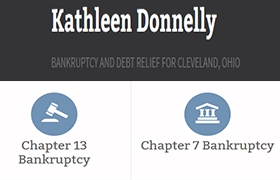Cleveland Collection Lawyer, Ohio
Sponsored Law Firm
-
 x
x

Click For More Info:
-
Law Office of Kathleen Donnelly
526 Superior Ave #1030 Cleveland, OH 44114» view mapChapter 7, Chapter 13, Free Evaluations Need Debt Relief? Contact Me Today
There is hope for debt relief. At the Cleveland, Ohio, law office of Kathleen Donnelly, we help people like you to escape from under mountains of debt.
800-413-4100
Kathleen Donnelly
✓ VERIFIEDBankruptcy & Debt, Consumer Bankruptcy, Bankruptcy Litigation, Credit & Debt, Collection
Chapter 7 or 13 Bankruptcy
Clients want results & meaningful results. Our goal is to achieve those results through dedication, hard work and total commitment to professional exc... (more)
Nicholas C. De Santis
Bankruptcy Litigation, Business Successions, Business Organization, Collection
Status: In Good Standing
FREE CONSULTATION
CONTACTC. Bradley Krapfl
Products Liability, Collection, Construction, Car Accident
Status: In Good Standing
FREE CONSULTATION
CONTACTMary Ann Rabin
Collection, Consumer Bankruptcy, Commercial Bankruptcy, Bankruptcy
Status: In Good Standing
FREE CONSULTATION
CONTACTFREE CONSULTATION
CONTACTRichard S. Geiger
Landlord-Tenant, Litigation, Arbitration, Insurance, Collection
Status: In Good Standing
FREE CONSULTATION
CONTACTDavid F Hodous
Administrative Law, Collection, Consumer Protection, Contract
Status: In Good Standing
FREE CONSULTATION
CONTACTAnn Wehener
Banking & Finance, Bankruptcy, Business Organization, Collection
Status: In Good Standing

 Kathleen Donnelly Cleveland, Ohio
Kathleen Donnelly Cleveland, Ohio About UsKathleen Donnelly
About UsKathleen Donnelly Contact UsCall or Email Right Now
Contact UsCall or Email Right Now

